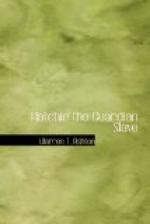Dalhousie perceived that the labyrinth he was engaged in exploring had not been the labor of the former owner of Bellevue, and he was perplexed to understand why Jaspar had taken such apparent pains to disarrange them. But Jaspar did have a motive; he had produced the disorder in his careless search for any paper which might be evidence against him. So heedlessly, however, had he ransacked the drawers, that, if any such were there, they must have escaped his notice. He was too much excited to do the work with the attention his own safety demanded.
Dalhousie continued to examine the papers, and Jaspar still trembled lest something might turn up which would give the overseer a confirmation of the opinions he had expressed at Vicksburg. Still Jaspar had not the courage to undertake the task himself. He allowed the overseer to perform it, in the very face of the danger he wished to escape.
The overseer seemed to Jaspar’s troubled vision perfectly indifferent. He could discover no anxiety in his features, to indicate that he had any other purpose than to do his employer’s bidding. A more close inspection would have developed a slight twinkle, as of anticipation, in the marble face of Dalhousie.
As he turned paper after paper, his eye rested upon a packet enclosed in a blank envelope. His curiosity was aroused, and, glancing indifferently at Jaspar, he saw that his piercing eye regarded him with intense scrutiny. Continuing his labor without disturbing the mysterious packet, he waited until the sharp eye of his companion was removed from him.
On the table by the side of Jaspar was a bottle of brandy, at which, at short intervals, the miserable man paid his devoir. Dalhousie did not, therefore, have to wait long before the keen watcher left his chair, and, with his back to him, took a long draught of the exciting beverage. The overseer, seizing the favorable opportunity, slipped the packet into his pocket. As indifferently as before, he completed the task, and Jaspar was relieved when he saw the papers again filed away.
Dalhousie sought his room, and, scarcely heeding the salutation of his wife, he seated himself, and drew forth the packet. Removing the blank envelope, he found it was a letter, directed to “Emily Dumont,” with a request to Mr. Faxon that it might be delivered to her after the writer’s decease. This seemed to imply that the writer had intended the clergyman as the keeper of the letter; but with this surmise the overseer did not trouble himself. He turned the letter over and over, examined the seal of Colonel Dumont, which was upon it, and, at last, as though he had satisfied the warning voice of conscience, he snapped the wax, and opened it. The letter was quite a lengthy one, yet, without raising his eyes, he completed the reading of it. A faint smile of satisfaction played upon his lips, as he re-folded the paper, and returned it to the envelope.
“You have a letter, Francois?” said his wife, who had watched him in silence as he read, and who noticed the complacent smile its contents had produced.




